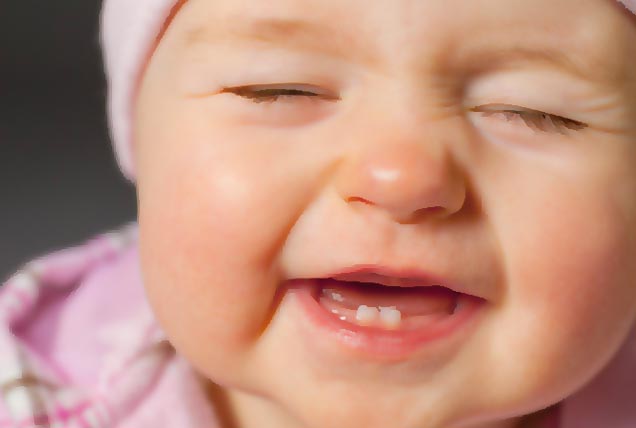The Baby Teeth Guide – How To Care For Your Infant’s Teeth
When to Expect Your Child’s Baby Teeth
Your infant’s first teeth will begin to appear around six to 12 months of age. You might wonder how important these primary teeth really are. After all, baby teeth are destined to fall out within a few years and be replaced by a full set of permanent teeth. However, baby teeth have important functions, and proper care can set the stage for excellent oral and overall health.
The appearance of your baby’s primary teeth around six to 12 months of age coincides with changes in your infant’s nutritional needs. Beginning at six months, exclusive breastfeeding is no longer nutritionally sufficient; this is the age at which you should introduce solid foods.
When To Introduce Soft and Solid Foods
At six to eight months, when your baby can start to chew, strained or pureed fruits and vegetables are appropriate. As your little one’s teeth grow in and chewing abilities progress through 12 months of age, you can gradually add cereal, bread, cooked meats, and other adult foods to his or her nutritious diet.
Although baby teeth are inevitably going to fall out and be replaced by permanent ones, making baby teeth last serves an important role that can have benefits into the future. Baby teeth serve as placeholders for permanent teeth. If they decay and fall out too soon, permanent teeth are more likely to grow in crooked.
How to Take Care of Baby Teeth
- Do not let your baby fall asleep with a bottle in his or her mouth. The lactose sugars in formula can rot the teeth is they are pooled on the teeth while sleeping.
- Brush your child’s baby teeth twice a day as soon as they come in.
- Floss your child’s teeth as soon as he or she has two teeth that touch.
- It is NORMAL to have spaces around the front baby teeth. This allows room for the bigger permanent teeth to grow in properly
When to Expect Baby Teeth to Fall Out
A baby tooth is intended to remain in your child’s mouth until the permanent tooth underneath it is ready to take its place. Sometimes, either due to a tooth being knocked out accidentally or being removed because of tooth decay, kids lose baby teeth before the permanent teeth are ready to erupt. If a tooth is lost, the teeth on either side of the open space may possibly push into the open space.
The result? There may not be enough room for the permanent tooth when it is finally ready to erupt. Depending on the timing, sometimes a “space maintainer” may need to be place on the surrounding teeth.
When to Bring Your Child For Their First Dentist Visit
Generally, between 2-3 years old. We strongly recommend using a pedodontist, whose office is strictly set up for children, both equipment wise and atmosphere wise. Ask us or your pediatrician for recommendations.







